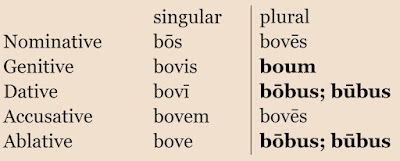[VI] HERCULES CLEANS THE AUGEAN STABLES AND KILLS THE STYMPHALIAN BIRDS
Deinde Eurystheus
Herculī hunc labōrem multō graviōrem imperāvit. Augēas quidam, quī illō tempore
rēgnum Ēlidis obtinēbat, tria milia boum habebat. Hī ingentī
stabulō continēbantur. Hoc stabulum, quod per trīgintā annōs nōn
pūrgātum erat, Herculēs intrā spatium ūnīus diēī purgāre iussus est.
Ille negōtium alacriter suscēpit, et prīmum labōre gravissimō maximam fossam
fōdit per quam flūminis aquam dē montibus ad mūrum stabulī dūxit. Tum partem
parvam mūrī dēlēvit et aquam in stabulum immīsit. Hōc modō fīnem operis fēcit
ūnō diē facillimē.
Post paucōs diēs
Herculēs ad oppidum Stymphālum iter fēcit; nam Eurystheus iusserat eum avīs
Stymphālidēs occīdere. Hae avēs rōstra ferrea habēbant et hominēs miserōs
dēvorābant ille, postquam ad locum pervenit, lacum vīdit in quō avēs
incolēbant. Nūllō tamen modō Herculēs avibus adpropinquāre potuit; lacus
enim nōn ex aquā sed ē līmō cōnstitit. Denique autem avēs dē aliquā
causā perterritae in aurās volāvērunt et magna pars eārum sagittīs Herculis
occīsa est.
[1] Ēlis, Ēlidis
[3/f]: Elis, an ancient Greek city-state
[2] tria milia boum
habebat │ (he) had 3,000 head of cattle
image: declension
of bōs, bovis [3 m/f]: head of cattle (cow, ox, bull); note the genitive and
dative / ablative plurals
[3] hī ingentī stabulō
continēbantur │ these were contained by a huge stable; ablative of means
but can translate as “in a huge stable”
[4] intrā spatium ūnīus
diēī │ within a period of one day
ūnus declines like any other 1st / 2nd
declension adjective except in the genitive and dative singular:
genitive: ūnīus
dative: ūnī
[5] nūllō …
modō │ in no way
nūllus, -a, -um:
not any; no
Note: ūnus
and nūllus belong to a group of nine words known as pronominal
adjectives which will be discussed in detail in later posts; for the moment,
simply recognise the meanings
[6] ē līmō
cōnstitit │ consisted of mud
cōnstō, -āre,
cōnstitī, cōnstātus [1] (here) consist; be composed of
līmus, -ī [2/m]:
mud
[7] dē aliquā
causā perterritae │ frightened for some reason
aliquis / aliquī
[m], aliqua [f], aliquid [n]: [i] pronouns someone; anyone; something; anything
[ii] adjectival: some; any
aliquis is normally a pronoun whereas aliquī
acts likes an adjective but that usage is not consistent
Note: ali-,
a prefix used to give a sense of indefiniteness, for example:
aliquandō: at some / any time; sometimes / now
and then; at one time (in the past)
aliquot: some; several; a few
aliquotiē(n)s: several times



No comments:
Post a Comment